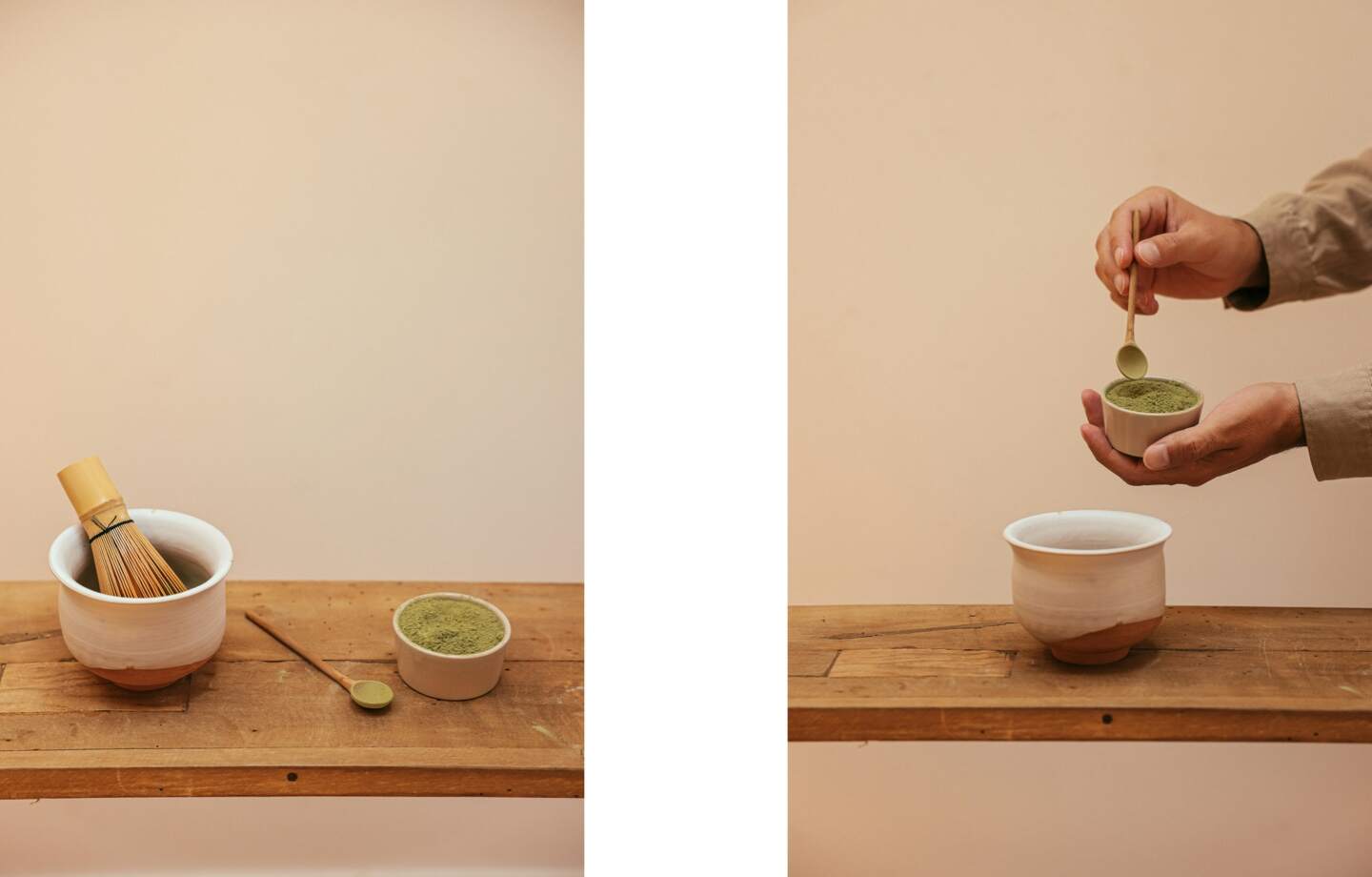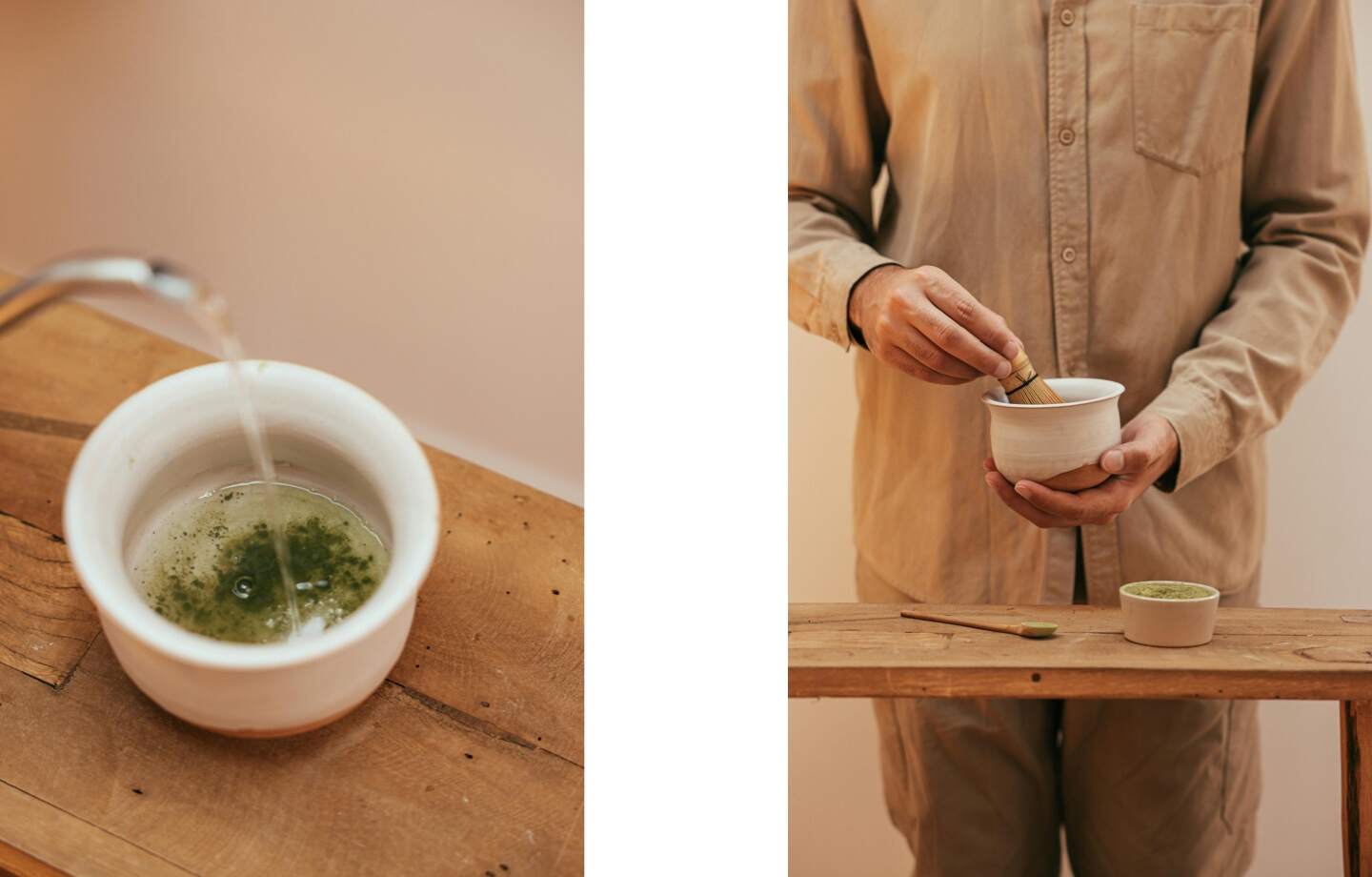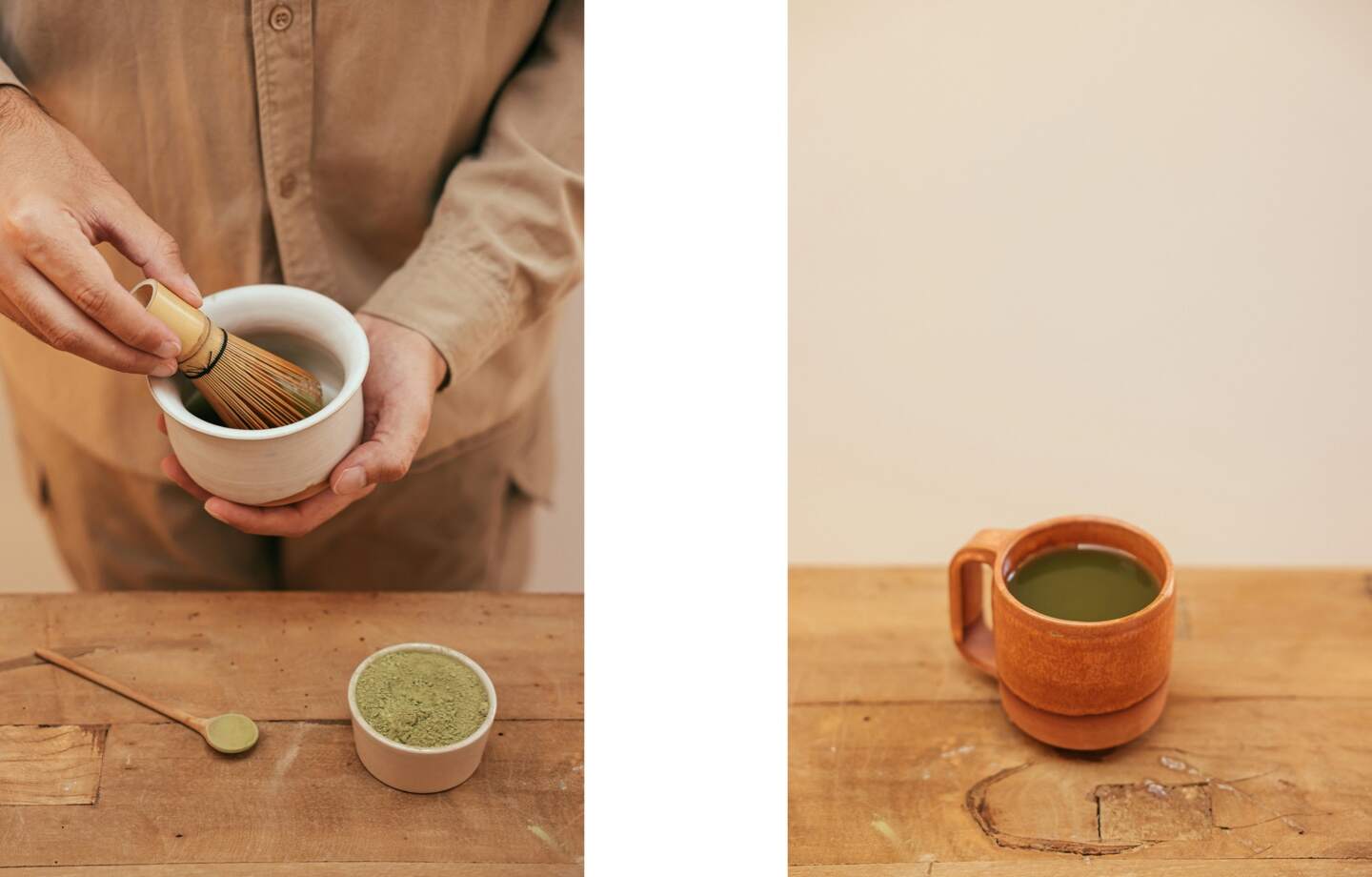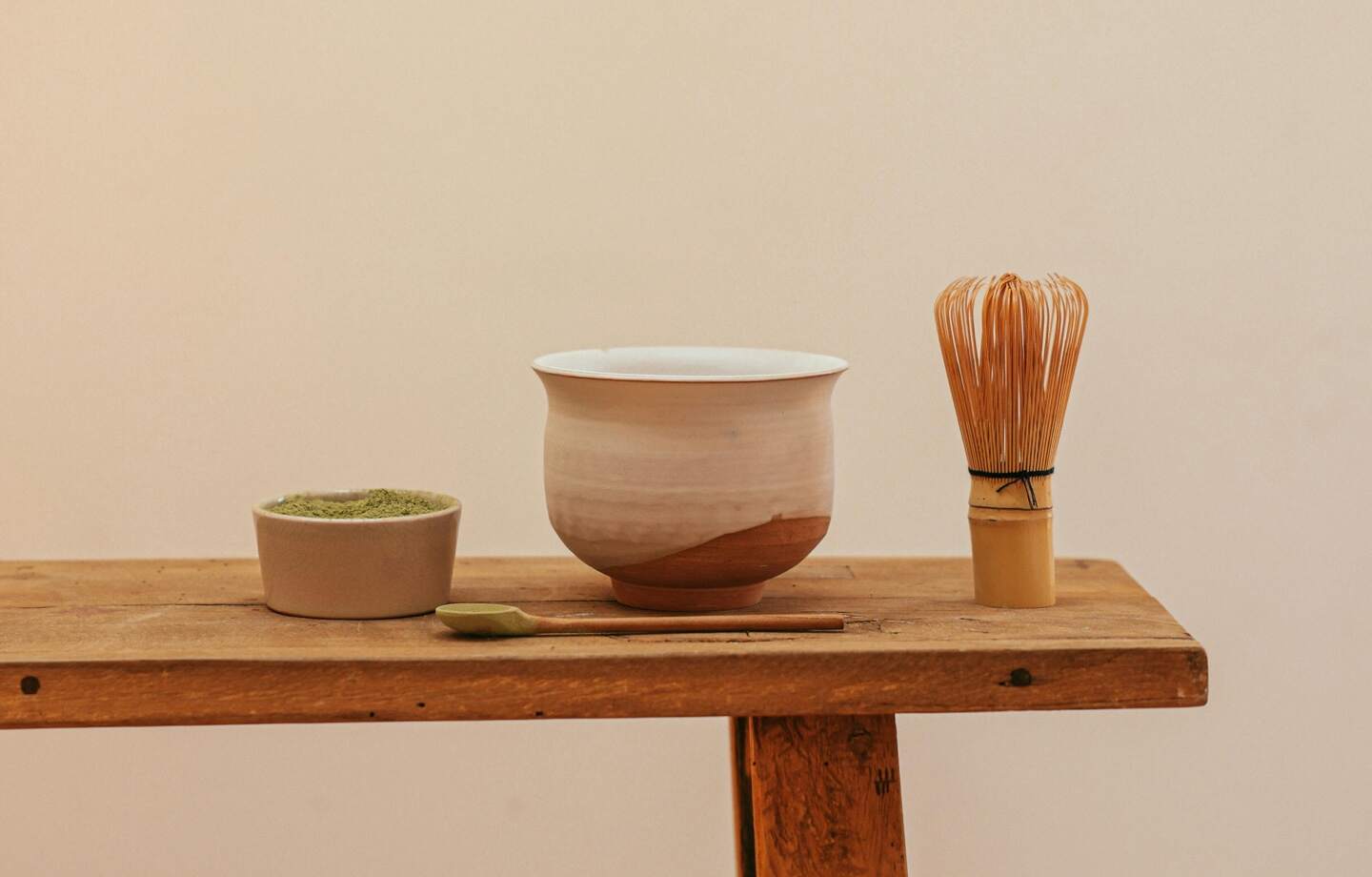From promoting relaxation to improving your gut microbiome, learn how switching from coffee to matcha can benefit your daily routine.
Daily habits can influence your health in big ways. And swapping one—a daily lunch walk in lieu of sitting at your desk or a magnesium mocktail instead of that evening glass of wine—can make a significant difference. Another easy swap: coffee for matcha.
Matcha is chock full of good-for-you antioxidants as well as compounds known for promoting relaxation, reducing stress, and even feeding good gut bacteria, among other things. It can even improve cognition after a sleepless night. And yes, it’s caffeinated, so you can still get that morning jolt of wakefulness.
But, what is matcha exactly? Matcha, at its simplest, is ground green tea leaves. To drink it, people whisk it in water, sometimes adding a nut or dairy milk. Traditional tea leaves used for matcha come from the Camellia sinensis plant and are grown only in Japan. Typically, matcha has less caffeine than a cup of coffee (matcha by itself contains about a third less caffeine than a cup of black coffee, though this can vary based on brand and preparation) (25 to 70 milligrams compared to the 95 to 200 milligrams in an eight-ounce cup of coffee)—though depending on where you source yours, it can have more. Unlike your espresso or drip coffee, matcha has an earthy flavor and a green color to boot. It shares many of the health benefits of green tea, plus others, like more of an amino acid that promotes calmness (more on that later).

Read more: DIY No-Date Matcha Energy Bites
Curious to swap your morning brew for matcha? Read on to learn more about the health benefits of the drink.
You don’t have to sacrifice your sense of peace to feel more alert. If you’re someone who is chasing both a morning wakeup and a greater sense of calm as you begin each day, consider switching to matcha. This coffee alternative includes l-theanine, an amino acid that can increase your levels of GABA, better known as dopamine and serotonin, chemicals that reduce anxiety and increase feelings of relaxation. A 2019 study showed that adults who took the amino acid over a four-week period experienced a decrease in stress.
However, there are two caveats to keep in mind. First, the amount of l-theanine matters. One study showed that matcha should have at least 17 milligrams of the amino acid per gram in order for a person to reap the benefits. Keep in mind that the actual amount of l-theanine in matcha can vary based on the grade of your powder. Some matcha brands include this information on their website. Matcha typically has more l-theanine than the average cup of green tea.
Also, the amount of caffeine in matcha powder can vary greatly depending on the brand. Some powders have more caffeine than a similar serving of coffee. If you want to balance alertness with feelings of relaxation, pay attention to the caffeine content (everyone’s threshold is different).
Short on sleep? No problem. The green tea in matcha has several compounds known for improving cognitive function, even after a night of tossing and turning. A 2021 study on sleep-deprived rats showed that when they were injected with the cognitive-boosting compounds found in green tea, they performed better in tests compared to rats not given the compounds. Additionally, a 2020 study of people over 60 showed that a daily dose of a matcha green tea powder may even protect women against cognitive decline.
So whether you want the short-term boon to your cognition after a sleepless night or the long-term benefits of better memory and attention, consider adding matcha to your morning routine.

Read more: A Spirulina & Matcha Latte Recipe
Another reason to love your morning matcha: It can help you burn fat. Studies have shown that matcha can increase fat oxidation during exercise. This is thanks to the combination of caffeine and a compound that neutralizes free radicals known as EGCG. Together, they promote fat burning. While you can’t only drink matcha and expect a change in your weight, its effect on fat oxidation during exercise (the study focused on brisk walks) can be another tool in your toolbelt when it comes to healthy living and exercise.
You’re probably familiar with antioxidants—they protect our bodies against free radicals, which are unstable molecules that can damage our cells. As we age, our ability to fight off free radicals declines, and this is linked to certain chronic illnesses, inflammation and disease.
So, what does this have to do with matcha? Green tea, the main ingredient in matcha, is rich in antioxidants. Your diet is an easy, inexpensive way to get your daily dose of antioxidants, and a morning matcha habit is a simple way to get more of the good stuff.
A happy, healthy gut is important. Your gut is responsible for helping your body absorb nutrients from the foods you eat. It’s even responsible for producing much of your body’s serotonin, a neurotransmitter that helps you feel happy. Your diet plays a significant role in creating a happy tummy—and matcha is linked to an improved gut microbiome, meaning that it supports the many beneficial microorganisms that live within it. This is in part thanks to compounds known as polyphenols, which are found in green tea, the main ingredient in matcha. Put simply, it improves the microbiome by promoting good gut bacteria and hindering bad gut bacteria.
Another benefit of a healthy gut is that it can help with weight management. According to a 2019 study performed on rats, good bacteria and less intestinal permeability (meaning, the gut absorbs water and nutrients properly) can decrease obesity risk.

Read more: How to Drink Caffeine Without Disrupting Your Sleep
Quick tips to keep in mind when choosing matcha:
- Heavy Metals: Green tea leaves are sourced from the Camellia sinensis plant. Depending on where this plant grows, it may become contaminated with heavy metals. When choosing a brand of matcha, do your research. Some brands specifically call out whether they are free of heavy metals and other toxins. You can also opt for organic matcha. Brands to try: Cymbiotika and Chalait.
- Caffeine: Though traditional matcha has less caffeine than coffee, some brands actually contain more. To avoid overdoing it, check the caffeine content (typically listed online or on the nutrition label) when choosing your matcha powder.
Have feedback on our story? Email [email protected] to let us know what you think!

Shop Pillows
The Essential Organic Pillow Collection
Gentle, breathable, non-toxic support.







